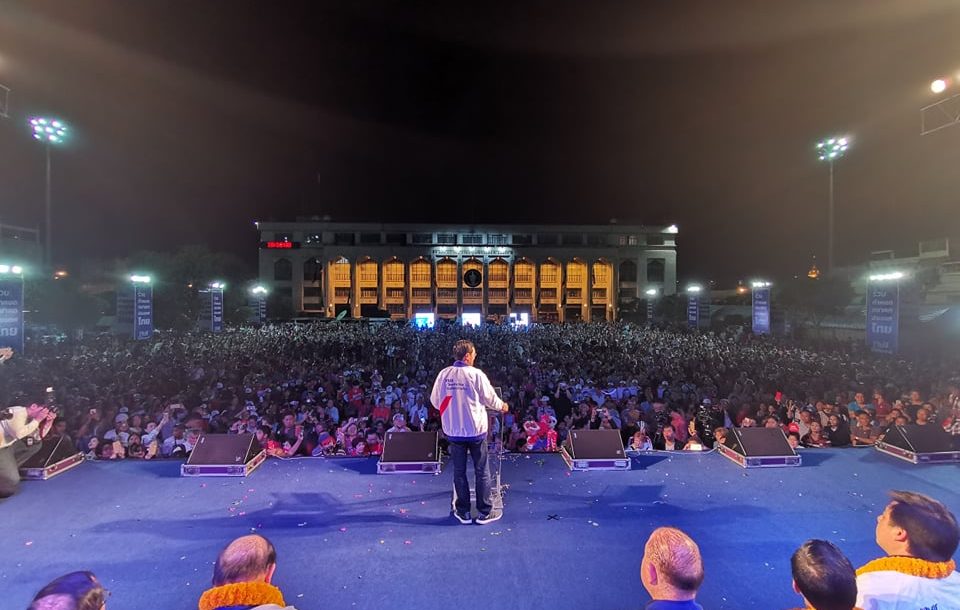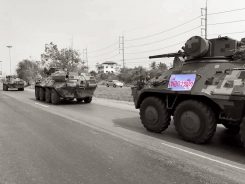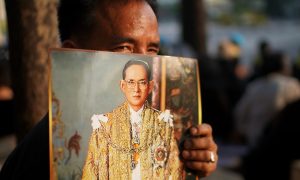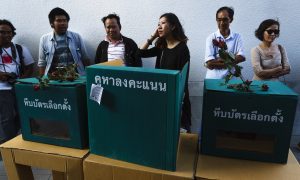With less than a month out before election day, New Mandala challenged Tewarit Maneechai, the editor-in-chief of Prachatai, to a discussion of big-picture questions on polling, parties and the post-election parliament. Tewarit is a veteran journalist as well as a former researcher at the People’s Information Center for the April-May 2010 Crackdowns. Here, he makes a case for looking beyond the agendas which are currently framing national politics (the NCPO vs. democracy)—understanding both the operations of political parties and the final outcome of the elections necessitates closer attention to more enduring dynamics such as candidate patronage and territorial strongholds.
• • • • • • • • • • • •
[NM] Each day, we’re seeing opinion polls presenting data on most-preferred prime ministers and parties. How reliable are these and what are their limitations?
[TM] Well, the polls are quite varied aren’t they? Some polls predict Pheu Thai as leading, actually many do. The contemporary context is that voters can no longer be neatly divided between two main poles—Pheu Thai and the Democrat Party—as prior to the coup. There are several players pushing an “anti-National Council for Peace and Order (NCPO)” platform. In much the same way, there several players pushing an “anti-Thaksin” platform—of course, Phalang Pracharat but also the Democrat Party. Inevitably, they are in competition for votes.When pundits make predictions about electoral results, a key factor influencing their analysis is the tide of public opinion, which is evaluated in terms of the agenda dominating national politics in that specific moment. Right now, the agenda can perhaps be summarised in the question, “Do we support or reject the NCPO?”, or something along those lines. But we tend to forget another more enduring factor, that many perhaps overlook in their analysis: many politicians, no matter the tide of public opinion, have territorially-rooted networks. Many have been active in politics in the same region for several years; some have been in politics since their mother and father’s generation.
Their presence in that region is an enduring one. They are not cases of parties suddenly “nominating an electric pole” [ส่งเสาไฟฟ้า]—a candidate who could theoretically be anyone, because voters would choose them in their capacity as a generic representative or stand-in for the party. No, part of the pull of these candidates is their personal networks in a specific area, networks which are of a patronage, philanthropic kind. Candidates of this variety are people who local people turn to when they have a problem, when they have a problem within the local community.
In this respect, elections are not simply determined by the agenda that is framing national politics. There are also agendas at a local level. What is more, the constitution has created a dilemma [see second question below] between those agendas, because there is only one ballot alone. And because that ballot emphasises the candidate, people will think of their local patrons first of all.
Pheu Thai has maintained MP candidates who are able to draw upon local networks, but at the same time Phalang Pracharat has succeeded in co-opting some former Pheu Thai MPs. People can see that some members of Phalang Pracharat were formerly Pheu Thai—if this is the case, it shows that voters are not consumed with concerns about “the Thaksin regime”! Somkid Jatusripitak himself [Deputy Prime Minister and a leading member of Phalang Pracharat] was once a minister under Thaksin. “Rambo Isaan” [Suporn Atthawong], a hardcore red shirt, was also once a part of the Thaksin regime but has now joined Phalang Pracharat.
How can we explain this [co-existence of ideology]? It shows that the designing of Phalang Pracharat’s operations has taken into account territorial loyalties. It shows that the party and the politicians know what motivates people to vote: knowledge that a candidate has been genuinely active in the local community. Anakot Mai (Future Forward Party) may generally have a positive image across the country, and may secure the youth vote, but most people may remain unpersuaded to actually check the ballot paper in favour of Anakot Mai because they have never seen its candidates working seriously at a grassroots level.
NM: And polling is specifically unable to capture these territorial diversities, because polls tend either to capture a spread of voters across regions or will limit respondents to a circumscribed territorial pool?
TM: Well, I do feel quite confident in the predictions presented by the NIDA poll: that Pheu Thai is the most preferred party, but that [junta leader General] Prayuth is the most preferred prime ministerial candidate. Why the divergence? When people are made to think along party lines, Pheu Thai is the most credible of all options. But when it comes to the personal popularity, in this current moment, nobody can compete with Prayuth because he has been raising his public profile, engaging in PR, for the past five years. His is a name and a face that everybody knows.
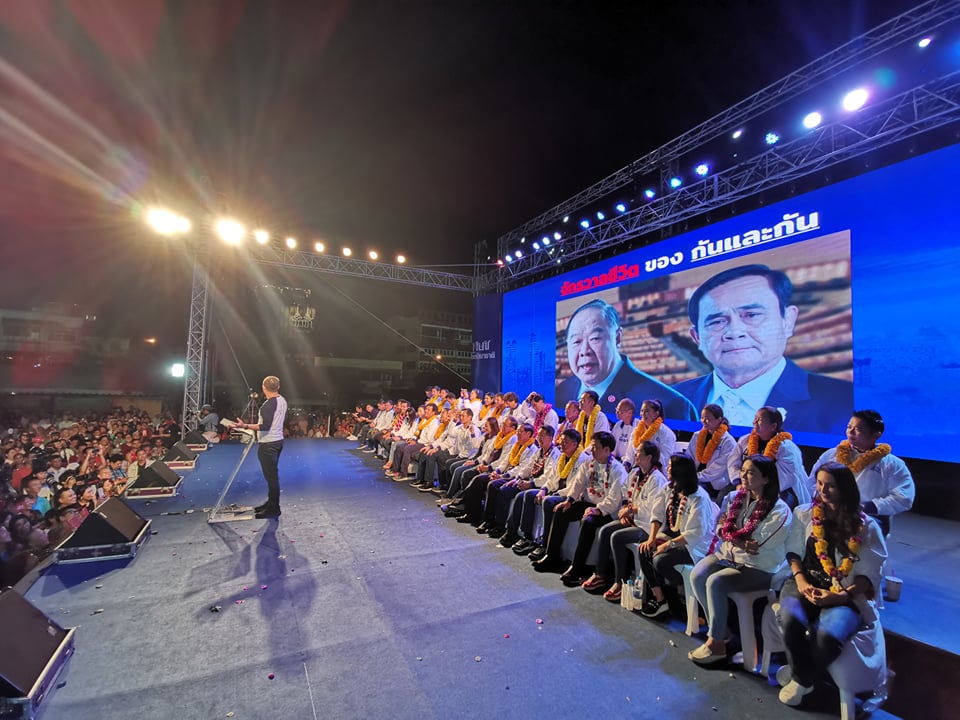
Nattawut Saikua pokes fun at junta leaders at a Thai Raksa Chart rally in Bangkok. Image credit: Noppakow Kongsuwan, permission for use granted.
Of course there are people who do not like Prayuth, but most ordinary people are not virulently opposed—they may think simply that he has mismanaged the economy, that he has botched public health insurance. But is that dislike and disappointment enough to persuade most ordinary people to reject him entirely? It may not be, if he is the most familiar candidate. So it is that the NIDA poll ranks him as the most preferred prime minister, ahead of Sudarat [Keyurapha, the first-ranked Pheu Thai candidate]. The concerns of ordinary voters, activists and academics may not be the same.
In saying this, polls always face constraints in accessing information—some respondents may not be willing to divulge preferences. Imagine you’re approached by somebody from the “NIDA Poll Institute”. The image of the government is of a government that oppresses criticism, one which arrests dissidents before sending them to “attitude adjustment”. Respondents may understandably be concerned about the consequences of providing answers that are critical of the NCPO or Prayuth. Some may provide “safe” responses that do not seriously reflect their views.
Suppose you’re a voter who is opposed to the military government. Which party should you vote for?
The answer depends on several factors. Suppose you’re a voter who is opposed to the NCPO prolonging its power, or you’re opposed to General Prayuth. [On the most basic level], the objective of your vote is to contribute to (1) a side which is able to outvote the 250 appointed senators (2) rejecting those parties who support General Prayuth (3) diminishing the influence of those parties whose allegiances appear yet unclear, but which would likely be ready to join a ruling coalition with Phalang Pracharat. In that last scenario, it may be the case that Phalang Pracharat has enough numbers to vote in Prayuth as prime minister [since the Senate decides this jointly with the House of Representatives]. But Phalang Pracharat may yet have a minority in votes when it comes to pushing legislation through the House of Representatives.
[In practice], however, the most strategic vote depends on the constituency you find yourself in. First, Pheu Thai is not fielding candidates in every single constituency. In constituencies where Pheu Thai is not competing, there are then other choices such as Thai Raksa Chart—but of course Thai Raksa Chart is at risk of being dissolved; on 7 March the Constitutional Court will release its ruling. Anakot Mai is another party which has clear intentions of opposing the NCPO. Seri Ruam Thai is a third option. Another option is Pheu Chart, whose leaders are members of the United Front for Democracy Against Dictatorship (UDD) or red shirts. Certainly, if your concern is to prevent the NCPO prolonging its power, you should consider these parties which have a clear stance against military rule.But the complicating factor is that your vote for a candidate is simultaneously counted towards determining party list seats [which are tallied nationally rather than within constituencies]. Suppose you are in a constituency where you are able to choose between a number of candidates [who oppose military rule]—a constituency where there is close competition between Pheu Thai and one or more of those small- or medium-sized parties [which may have strong local support but nearly non-existent odds of commanding a national majority]. If you choose one of those small- or medium-sized parties, it is tantamount to withholding a vote from Pheu Thai [when it comes to the party list]. If you’re in such a constituency, your choice is very complicated indeed—the best choice at a local level (that is, a vote for the candidate who you desire to be your representative as a member of parliament) may not be the best choice at a national level (that is, a vote for the party will make the difference in unseating the NCPO).
So, should you simply vote for Pheu Thai—particularly in a constituency where Pheu Thai is in close competition with Phalang Pracharat or even the Democrat Party? In theory, every vote counts towards determining party list seats. So alright, let’s say you vote for Pheu Thai in order that its candidate wins in your constituency and so that Pheu Thai gets one more party list vote. But it may be the case that Pheu Thai will already have reached its quota of allocated seats through constituency seats alone. Then your party list vote becomes superfluous. Pheu Thai may not even receive any party list seats. [Editor’s note: The formula for determining a party’s party list seats involves subtracting the number of constituency seats the party has received from the percentage of votes the party has received out of total votes. Under this system, if a party’s constituency seats is already equal to the proportion of votes it received, it would receive no additional party list seats]. The system is not quite fair; it’s a strange system. But in the very least, you can guarantee that you’re contributing to a Pheu Thai victory in your constituency.
So let’s consider a second choice: Anakot Mai. If you vote for an Anakot Mai candidate, the chances that you will “sacrifice” your vote when it comes to constituency seats is quite high (that is, the chances of the Anakot Mai candidate losing against another candidate in your constituency). I don’t think that Anakot Mai expects to win a lot of constituency seats—well, perhaps they have hopes in some constituencies—but my evaluation is that many of their candidates will lose because they were not politicians prior to this election. They have no history of working at a grassroots level, which is not the case with Pheu Thai. [Many] Pheu Thai candidates have a territorial base, a voter base. In this respect, if you vote for Anakot Mai, you’re holding out only for party list seats.
Still, there is some possibility that if you vote for Pheu Thai, you will contribute to both a constituency seat and party list seats, because the party’s strategy has been to deliberately refrain from fielding candidates in all constituencies [in an attempt to counterbalance the subtraction of constituency seats from the number of party list seats received]. In this respect, a provisional rule of thumb could be: if you’re in a constituency where Pheu Thai has a good chance of winning, giving your vote to Pheu Thai could be the best choice. If you’re in a constituency where Pheu Thai has not fielded a candidate, then you have other choices such as Thai Raksa Chart if they are not dissolved or Anakot Mai.
Tell me about Pheu Thai’s first-ranked prime ministerial candidate, Sudarat Keyuraphan. Why was she chosen as the party’s first-ranked nominee?
Sudarat, well, she was a new face in politics back in May 1992. She was once a member of the Phalang Dharma party, at around the same time as Thaksin. She was then a minister under Thaksin’s government [Editor’s note: In 1998, Sudarat co-founded Thai Rak Thai alongside Thaksin, and was later appointed Deputy Leader. From 2001, she was Minister of Public Health and then Minister of Agriculture and Cooperatives before the 2006 coup deposed the Thaksin government]. After that [the 2006 coup], she kept a quieter public presence.
In general, she has an image of being a compromiser and her networks are based in Bangkok. She has considerable political experience. She is much more well-known than, as a point of comparison, Chadchart [Sittipunt, Pheu Thai’s second-ranked nominee]. Sudarat is more familiar to older voters and voters who may not be hooked into social media, even though Chadchart commands online. Chadchart himself once said that, while he may be a “net idol” and a meme and popular on social media, he is not nearly as well known as Sudarat in rural and provincial areas.
Sudarat is more popular, and has an image of being a moderate despite firm standpoints of opposition to the NCPO and General Prayuth. She does not appear to be of a “hardcore” thread, but appears as someone who may be able to facilitate conversation between different groups. If the majority of Thai people do not want to see the country dissolve into open political conflict again, for those who do not want a return of chaos, Sudarat presents a choice worth considering.
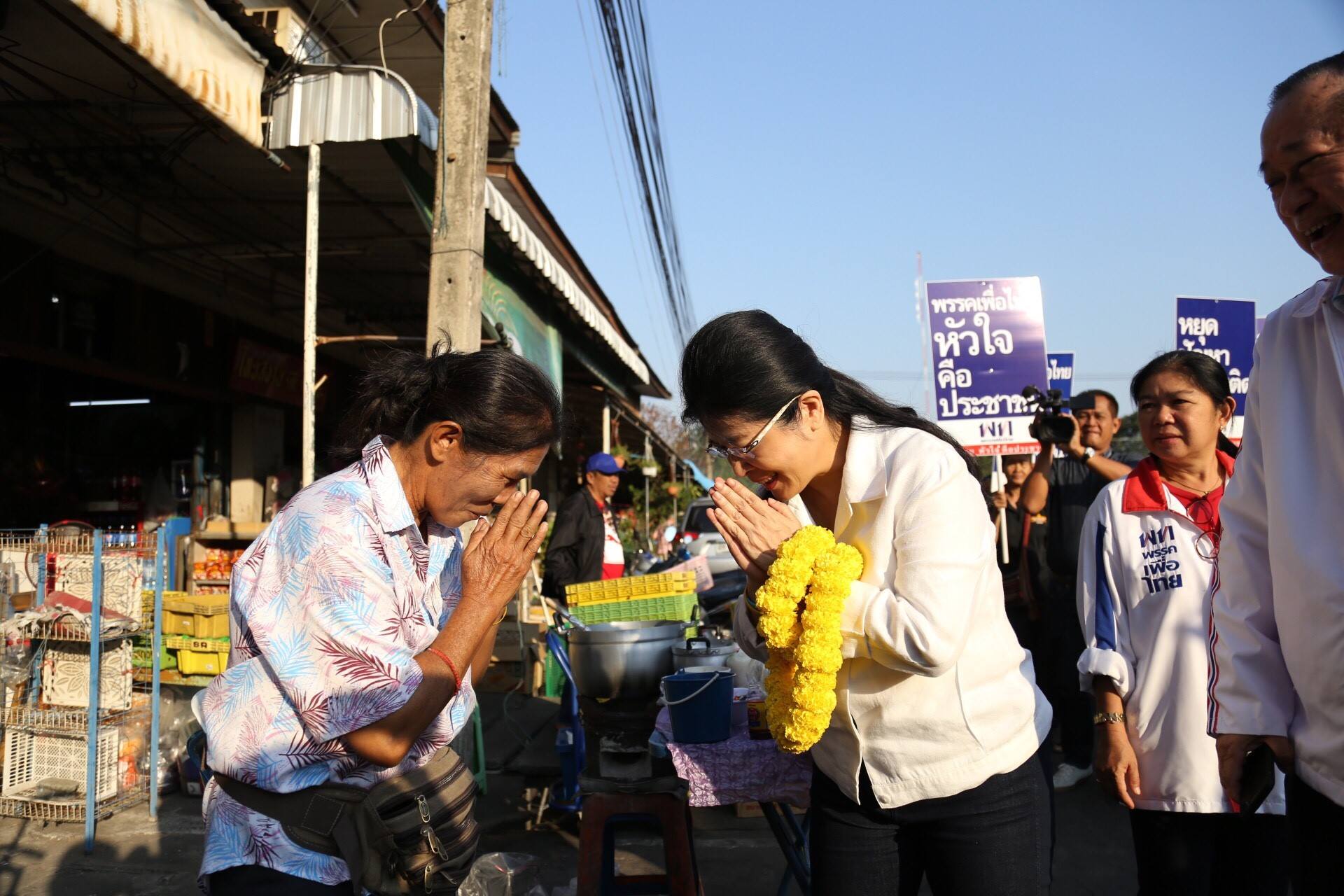
Sudarat out and about campaigning. Image credit: Pheu Thai’s Facebook page.
What’s the relationship between the Pheu Chart party and Pheu Thai? Are they simply allies in the electoral race, or is there something more complex?
For the most part, Pheu Chart’s networks are drawn from red shirt activists and the UDD. The party’s leaders are either red shirts or financial supporters of the red shirts; even red shirt leaders themselves are key figures in the party, such as Jatuporn Promphan. From the perspective of ideology and principles, we may say that this group are pro-parliamentary democracy and reject the seizure of power by coups and extrajudicial means. It seems that many Pheu Chart candidates are part of a strategy to maximise votes [alongside Pheu Thai and Thai Raksa Chart, under the single ballot system].
Pheu Chart’s relationship to Pheu Thai is difficult to pin down, however. That is, Thai Raksa Chart and Pheu Thai appear to be co-ordinating at a much closer level, given that they have divided constituencies between themselves. Pheu Thai is not fielding in all constituencies; Thai Raksa Chart is not fielding in all constituencies. In contrast—you’ll have to double-check this—I understand that Pheu Chart is competing in almost every constituency [Editor’s note: Pheu Chart is fielding candidates in 283 constituencies out of 350. In way of comparison, the Democrat Party is fielding in the most constituencies (341) followed by Phalang Pracharat (335), Seri Ruam Thai (333) and then Anakot Mai (330)].
When it comes to ideology, Pheu Chart and Pheu Thai may be on the same path, but I’m not privy to what goes on behind the scenes. What we can see from Pheu Chart’s campaigning, however, is a considerable pro-Thaksin and pro-Yingluck slant. For example, candidates in several constituencies legally changed their names to “Thaksin” and “Yingluck”. [Editor’s note: Yes, they really did this]. So it’s undeniable that both parties draw from an overlapping voter base and ride to some extent on Thaksin’s popularity.
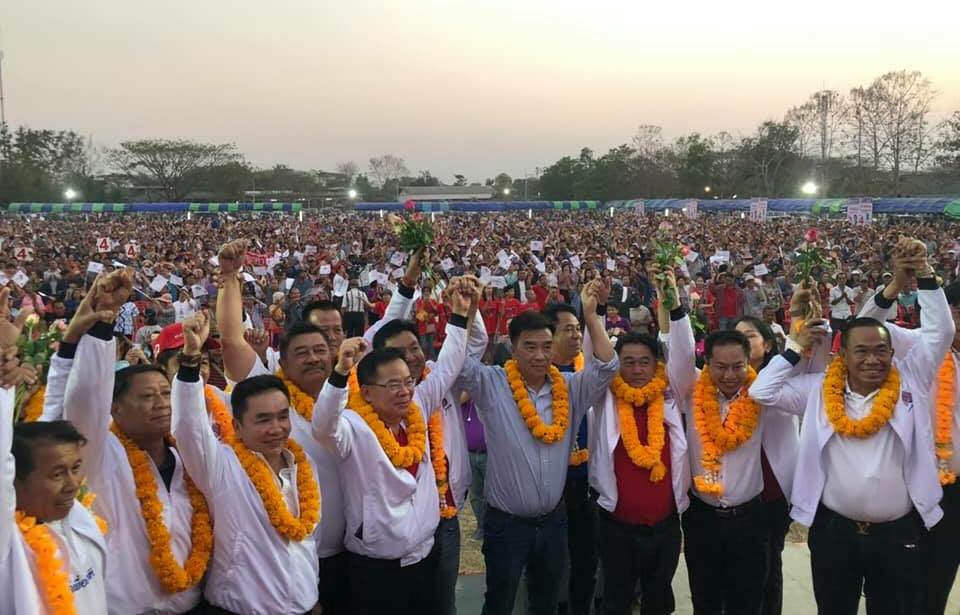
Pheu Chart rally in Phayao province. Image credit: Pheu Chart’s public Facebook page.
Suppose that the Constitutional Court does not dissolve Thai Raksa Chart. How will the outcome of the election differ in that prospective future, compared to an alternate reality where Ubolratana never announced her aborted prime ministerial candidature at all?
There is some discourse of disappointment from Thai Raksa Chart supporters that the party nominated a member of royalty—but I think the numbers of those people are few and far between, no more than 1,000. No more than that—they are activists, academics and intellectuals. They do have some influence in informing the views of broader members of the public, but I don’t think enough to convince huge numbers not to vote for Thai Raksa Chart or Pheu Thai.
Now, suppose that the Constitutional Court does not dissolve Thai Raksa Chart. It is now known to the general public that Thai Raksa Chart was able to nominate Ubolratana as their prime ministerial candidate [before this was aborted]. Ordinary people will be made to feel that past accusations that Thaksin conspired to overthrow the monarchy was just discourse built up to undermine him. The tide of opinion may swing—a great deal more people will probably be persuaded to vote for Thai Raksa Chart and Pheu Thai.
These may also be an effect within the state. Various groups within the state and the bureaucracy endeavor to monitor and read signals; in the past under Rama IX, the network monarchy did not operate through direct communication. This time, various groups with influence working within state and bureaucratic institutions may “read” the message that this party [Thai Raksa Chart] is able to link up with the monarchy. The likelihood then that state institutions would operate in support of Thai Raksa Chart would be quite high, viewing the party as ของจริง [“the real deal”].
[Editor’s note: The following in brackets was a post-interview conversation to clarify what Tewarit meant by ของจริง.
NM: Do you mean that members of state and bureaucracy will have read the events as signaling the monarchy’s tolerance of Pheu Thai?
TM: This is possible.
NM: But the King explicitly rejected Ubolratana’s entry into electoral politics.
TM: But we’re discussing a situation where the party was not dissolved. The monarchy’s approval may not be complete, but if the party is not dissolved, that would be a direct signal that Pheu Thai has been allowed to continue on.]
In contrast, if Thai Raksa Chart had never nominated Ubolratana, the image of the party would have been no more than a party of Thaksin.
Suppose that Prayuth emerges as prime minister after the elections. Thai history has seen multiple instances of military leaders either enacting coups against their own proxy governments or the governments that they themselves lead. Will Prayuth similarly lose patience with governing through a coalition or via a proxy?
Prayuth will have to have enough patience, because he no longer has control over military forces—well, he has some but not absolutely in the way he did when he was Commander in Chief of the Royal Thai Army five years ago. Power over the military rests with the Commander in Chief. These days, the NCPO is just “the head”, but is without a base [of loyalty and networks among mid- and low-ranking forces].
NM: Right, I raised this question because we had Prajak Kongiraki write an article predicting that the military might ultimately lose patience with semi-authoritarian rule or governing through a coalition. Then we had Jatuporn Prompan, the chairman of UDD, state even more firmly in an interview [forthcoming] a belief that the military-controlled post-election government will not last—that there will be military intervention to bring the system to a state similar to what we have seen over the past five years.
But I don’t believe that a coup would be possible. That would be extremely difficult, because Prayuth is in a position where he must compromise with [other military leaders]. The military is not monolithic. It is compromised of many competing groups, merely that at any given moment one or some are better positioned than others to manage that competition. Those best positioned within such competition are leaders with commanding control over ground-level forces, especially within the army. So the question is how much control does Prayuth have over the armed forces? Perhaps not a great deal—presently he is only the head of the NCPO. After the elections, the NCPO’s power will progressively decline. The military will be almost divorced from Prayuth’s authority. He may maintain some old connections and some factions within the armed forces may continue to support him—but that authority will be far from inclusive of all of the military.
I believe that Prayuth will have to tolerate governing through [semi-authoritarian] parliamentary politics. It will be difficult for him to command the same authority over the armed forces as he did [during the 2014 coup]. Perhaps he might succeed in selling his political project to other military leaders, but the leader of a prospective coup would not be Prayuth. He would not be able to enforce the necessary commands. Don’t think of the military as a unitary thing—it is varied as any other institution.
In comparison to past elections, how much of a game changer is the rise of social media?
The majority of Thai people access social media in some form, whether it be Facebook, Twitter or Line. In comparison to 2011 and 2014, social media is one, and almost the main, channel where people encounter information and news about policy, political mobilisation and debate. If your question is how much social media will influence this round of elections, I can answer: “very much”. While the Election Commission has released regulations limiting parties’ use of social media, it remains a platform for campaigning, though the effect may be less people using it to explicitly canvass for votes.
NM: But what about the argument that social media users in Thailand represent only certain demographics?
While it’s true that the most active users of social media are middle class and younger generations, older demographics still access it—Line would be the most popular platform among those groups. Youtube is also a platform that is widely accessed.
Q&A: Supalak Ganjanakhundee on Thailand’s week of chaos
The editor of "The Nation" talks to New Mandala.
While not everybody may use social media as a channel for directly accessing information about politics, journalists are increasingly distributing content from social media in mainstream media, meaning that content reaches a broader general public. Social media’s influence cannot be denied—even though there are issues of the “echo chamber” effect inherent in algorithms—because journalists are proliferating discourse which originated in social media in other spaces.
In the upcoming election, what’s the importance of small- to medium-sized parties (such as Bhumjaithai and Anakot Mai) who are almost certainly unlikely to win a majority of seats?
Parties like Bhumjaithai have strong regional bases. Bhumjaithai is popular, for example, in the south of Isaan, where they’re guaranteed to receive at least a few MPs. They are competitive even in the Deep South, actually. When you see their campaign posters in Bangkok, I think these are oriented towards party list seats because they have no hope in Bangkok. They aren’t aiming to win seats in Bangkok, but are hoping to draw in votes that will matter when party list seats are tallied nationally. Bangkok is also filled with internal migrant workers from other provinces; [for a party like Bhumjaithai] campaigning in Bangkok is tantamount to campaigning in provincial constituencies. In specific regions of the country, these parties are forces to be reckoned with.
At a national level, though, will they impact the outcome of parliamentary politics? It is quite possible their influence will be significant. If Phalang Pracharat is unable to receive enough votes to form government, it will have to court these parties into a coalition. These small- to medium-sized parties may not even campaign about national politics—they may not have a clear pro-NCPO stance, or a stance opposed to the continuation of military rule that is as rigid as Anakot Mai’s. As such, they are ready to join any side of politics, whether with Pheu Thai, Phalang Pracharat or even with the Democrat Party. These parties may be the deciding factor.
The two big parties are in direct competition, aren’t they? But in the end if one is to win, they may have to pull one or more small or medium-sized parties into a coalition. The votes [for prime minister] exercised by MPs from these parties are extremely valuable. The weight of one vote from a Pheu Thai MP may not equal one vote from an MP that represents one of these smaller parties, because the latter has great leverage to bargain for policies that will benefit their region, territory or constituency. Their vote is crucial. If a large party loses their vote, they may lose their chance of forming government. As such, [Pheu Thai and Phalang Pracharat] will bend over backwards to appease those smaller parties.

Youth swarm Thanathorn at a meet-up in Bangkok. Image credit: Thanathorn’s public Facebook page.
Finally, in your view, what will the distribution of seats look like in the post-election parliament? If there is no outright majority across the Senate and House of Representatives (required to vote in the prime minister), which small- to medium-sized party will play the role of “kingmaker” in determining the coalition that forms government?
If Pheu Thai “holds hands” with the Democrat Party, or if the Democrat Party “holds hands” with Phalang Pracharat … whoever is able to pull the Democrat Party into a coalition will be able to set up government. The number of MPs that Phalang Pracharat receives coupled with the 250 appointed senators may be a considerable block, but may still fall short of the numbers required to set up government—but they would certainly be able to do so with the seats received by the Democrat Party, even though the Democrat Party’s share of votes is likely to decrease this election. The same is the case for Pheu Thai: if their numbers are reinforced by the Democrat Party’s seats, they will be able to make government. The Democrat Party won’t receive the most seats, but I believe that the side which is able to persuade it to join forces will be the side that forms government.
NM: But do you think the Democrat Party will be willing to form a coalition with Pheu Thai?
If they were not willing, they wouldn’t be so circumspect. Abhisit himself has not shot down the possibility of joining forces, though he speaks in the ambiguous language of principles—“not participating in Thaksin’s regime”. If Pheu Thai pledges not to push for Thaksin’s return, or something like that, the Democrat Party may be willing to form a coalition—though such a partnership may be more difficult and less organic than one with Phalang Pracharat.
Anakot Mai might have the opportunity to play kingmaker if the tide is in their favour; new voters may make a decision according to what appears presently attractive. But I believe most voters—those who have cast votes before this election—will decide according to past connections and networks, for who they know has been active in their community.
 Facebook
Facebook  Twitter
Twitter  Soundcloud
Soundcloud  Youtube
Youtube  Rss
Rss 